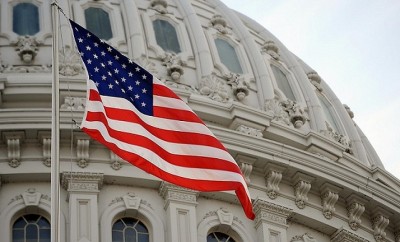
How the EU Treats Friends Worse Than Foes
Compare its treatment of Switzerland with its mild response to Belarusian dictator Alexander Lukashenko.
The Swiss government’s decision last week to withdraw from negotiations with the European Union over upgrading their relationship was never going to dominate the headlines—outside of Switzerland, that is. Yet even for Americans, the standoff is more than a mere curiosity. It illustrates a mentality pervasive among the EU’s officialdom, which often treats the bloc’s friends worse than its adversaries. The same intransigence contributed to Brexit, regularly drives U.S. administrations (regardless of political party) up the wall, and ultimately does no favors to Europeans themselves.
Despite not being an EU member, Switzerland participates in many aspects of the integration project. Generally speaking, the country enjoys access to the EU’s single market, with its 500 million consumers, and the EU is Switzerland’s most important trading partner. Unlike Norway and Iceland, who are members of the European Economic Area, the Swiss-EU economic relationship is governed by a patchwork of some 120 sectoral agreements that guarantee the Swiss market access in exchange for a commitment to (essentially) follow the EU’s regulatory practices. Switzerland’s labor market is also open to the EU’s citizens, and per the 1985 Schengen Agreement, there are no passport checks on Swiss borders with neighboring EU countries (or at least there were none before COVID).
The relationship remains highly complicated. For example, Switzerland is not in a customs union with the EU, which affords it some flexibility in striking trade agreements with countries around the world. The process of translating the EU’s rules into the Swiss legal system is not completely automatic either, and when Swiss and European policies diverge, the country risks losing its “regulatory equivalence” and therefore market access. Needless to say, policies change both in Brussels and in Bern. Making things more complicated is the fact that Switzerland is a federal state with some aspects of economic regulation determined autonomously at the cantonal level.
In some sectors, business goes on without explicit rules. The country’s electricity market, for instance, is physically integrated with the EU’s grid, but Switzerland is not part of the EU’s ambitious energy policies, and its cross-border trade in energy relies largely on informal arrangements.
As it was playing hardball with the U.K. in its Brexit negotiations, Brussels came to the conclusion that maintaining the complex relationship with its countless carve outs and ad-hoc deals was no longer in the EU’s interest—especially given the EU’s insistence on the indivisibility of the bloc’s four freedoms of movement of goods, services, capital, and people. Instead of renegotiating each of the bilateral deals guiding market access separately, Europeans have started insisting on a broad “Institutional Agreement,” which would place Switzerland, like Norway and Iceland, more firmly into the position of a “rule taker” instead of an equal partner.
Shockingly, the Swiss are not keen on the proposal. The main points of contention include the question of state aid to Swiss companies. While there were good reasons to accompany the EU’s single market with restrictions on the ability of national governments to subsidize their national champions and prop them with unfair advantages, the European Commission’s understanding of “state aid” has grown far too expansive and includes broad-based tax breaks, essentially clamping down on low-tax and small-government countries in the EU.
Another issue revolves around the tax treatment of workers from EU countries in Switzerland. Immigration has been a hot-button issue in Swiss politics for a long time. In a 2014 referendum, a slim majority voted for measures to restrict immigration, including from the EU. As a result, Croatian nationals (who just joined the EU) were barred from accessing the Swiss labor market, which led to convoluted negotiations with Brussels.
Today, the EU’s obstinate insistence on exactly the same level of access to “in-work benefits” is needlessly increasing the salience of the issue again. The same red line was one of the justifications for David Cameron’s—arguably irresponsible—decision to call a referendum about the U.K.’s own membership in the EU. More recently, Austria came under fire for seeking to reduce the benefits available to Eastern Europeans from neighboring countries who form a significant part of the workforce, especially in services.
In both cases, taking the idea of a level playing field too far is unhelpful. It is perfectly reasonable, for example, to allow citizens of other countries to access Swiss, Austrian, or British labor markets while denying them tax benefits (say, a child credit) that are used as tools of domestic social policy. Yet the received wisdom among the mandarins is that there is no spectrum on which compromises could be struck, and that the EU’s founding ideals will somehow not be fulfilled unless rules guiding tax and welfare policies among its countries are exactly the same.
With that attitude, the EU is bound to drive many of its potential friends away. Already, the deterioration of the EU-Swiss economic ties have had consequences. In 2019, Swiss stocks were banned from being traded in the EU (a move for which the Swiss retaliated by banning EU stocks). More recently, market access guarantees for Swiss medical devices have expired, potentially forcing Swiss exporters to apply for certification with the EU’s rules. Without new agreements in place, non-tariff barriers will crop up in a growing number of sectors where mutual recognition is guided by deals that date back, in some cases, to the 1970s.
Dalibor Rohac is a resident scholar at the American Enterprise Institute in Washington, D.C. Twitter: @DaliborRohac.
Συνέχεια ανάγνωσης εδώ
Πηγή: thedispatch.com





